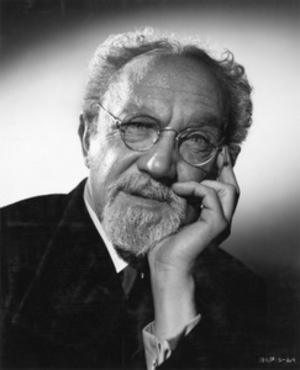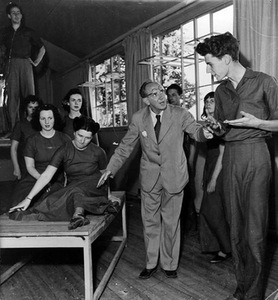Michael Chekhov's model of stage expression 3
In brief: Human life is a complex process, resolved into multiple psychological processes. It can be described as irrational and impossible to organize. According to Michael Chekhov, it is never so primitive that it could be played on the stage.
The originality of M. Chekhov model of stage expression become apparent in the context with other methods of the actor, especially with Konstantin Stanislavsky system of actor's self-preparation. In the latter, actors external expression is perceived as mimetic (imitating reality), consciously controlled activity that serves the forming of the realistic role portrait. On the other hand, M. Chekhov's type of expression is determined by the ability - which functions in the unconscious - to spontaneously make intuitive decisions, which dispersion is connected to the productivity of imagination.
M. Chekhov's acting nature can be highlighted by distinguishing three main phases: the understanding of character's nature (search for ideological dimension), characterization of the role (qualitative aspect of the role) and actor's stage expression (the external expression of the role). The treatment of the physical body plays a very important role in the quality of expression. According to Lenard Petit, the understanding of body as an instrument forces actor to become sensitive to movement. This attitude refers to the importance of the physical expression, not only during the stage act, but also during the creative process, during the actor's workout. L. Petit notices that dynamic principle can be found in all the Chekhov's exercises - it is visible in the structural relations that link individual aspects into a solid formation with such principle that one exercise reflects the whole of the method.
M. Chekhov's method requires an actor to get acquainted, as much as possible, with the character's features, feelings and experiences, even if they do not exist in the structure of the play. Such principle becomes important in forming really positive or very negative characters (in a stereotypical sense) who usually lack psychological illustration in the dramatic text. In this case, for each feature of the character actor needs to find an opposite one so that the role would maintain a psychological balance and would not be static, one-way and clichéd.
M. Chekhov's method poses two main ways of psychological acceptance of feelings and reactions to them. In the first case actor adopts impressions and reacts to them directly and spontaneously and the nature of the feeling reflects the question (in actor's emotional expression - cause provokes an effect). In the second case, actor's spontaneous reaction is not possible and it requires reflection on the question or posing it once again (cause needs to be examined psychologically). This model explains that actor is able to sense some feelings (more often emotions) spontaneously, but complex feelings, which combine various emotions are difficult to acquire, that is why actor has to prepare for them and psychologically awaken necessary senses and emotions within. According to M. Chekhov, in everyday life, feelings are always born inside a person, directly, and he senses them suddenly and spontaneously, but feelings in actor’s profession cannot be random, because they depend on the playwright's material, director's interpretation and on the general idea of the play.
Article series: Method of Michael Chekhov in the 21st century


